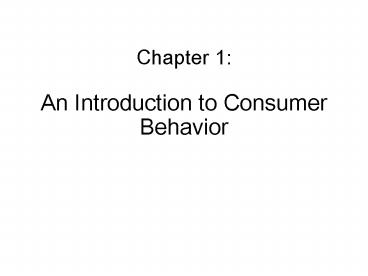Chapter 1: An Introduction to Consumer Behavior - PowerPoint PPT Presentation
1 / 15
Title:
Chapter 1: An Introduction to Consumer Behavior
Description:
Consumers perceive a problem then move through a series of rational ... Kant's categorical imperative. The TV test. An Organizing Model of Consumer Behavior ... – PowerPoint PPT presentation
Number of Views:53
Avg rating:3.0/5.0
Title: Chapter 1: An Introduction to Consumer Behavior
1
Chapter 1 An Introduction to Consumer Behavior
2
Consumer Behavior
- The study of the
- buying units and the
- exchange processes involved in
- acquiring,
- consuming, and
- disposing of
- goods,
- services,
- experiences, and
- ideas.
3
Why Study Consumer Behavior?
- Foundation of Marketing Management
- Public Policy and Consumer Behavior
- Altruistic Marketing
- Personal Value
4
Three Research Perspectives on Consumer Behavior
- The Decision-Making Perspective
- The Experiential Perspective
- The Behavioral Influence Perspective
5
The Decision-Making Perspective
- Consumers perceive a problem then move through a
series of rational steps to solve it
- Problem Recognition
- Search
- Alternative Evaluation
- Choice
- Postacquisition Evaluation
6
The Experiential Perspective
- Buying results from the consumers need for fun,
to create fantasies, obtain emotions, and
feelings.
7
The Behavioral Influence Perspective
- Strong environmental forces propel consumers to
make purchases without necessarily first
developing strong feelings or beliefs about the
product.
8
Exchange Processes and Consumer Behavior
- Exchange transfer of something tangible or
intangible, actual or symbolic, between two or
more social actors.
9
Prerequisites for Exchange
- Two or more parties
- Something of value to the other
- Capable of communication and delivery
- Free to accept or reject the other's offer
- Believe that it is appropriate or desirable to
deal with the other
10
Elements of Exchange Six Types of Resources Are
Exchanged
- Goods
- Service
- Money
- Information
- Status
- Feelings
11
Dimensions of Exchange Relations
- Four types of consumer exchange relations have
been identified - Restricted versus Complex
- Internal versus External
- Formal versus Informal
- Relational versus Discrete
12
Ethical Issues in Consumer Exchange Relations
- Ethics the study of the normative judgments
concerned with what is morally right and wrong,
good and bad.
13
Ethical Issue Examples
- Misrepresentation
- Conflict of interest
- Free riding
14
Ethical Guidelines
- The golden rule
- The professional ethic
- Kants categorical imperative
- The TV test
15
An Organizing Model of Consumer Behavior
- Five primary components
- The Buying Unit
- The Exchange Process
- The Marketer's Strategy
- The Individual Influencers
- The Environment































